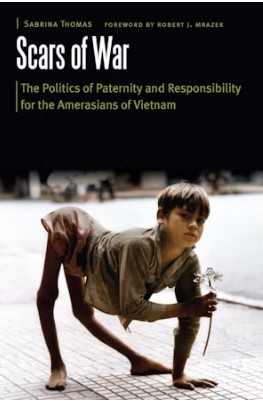Sabrina C. Thomas
Email: Sabrina.C.Thomas@ttu.edu
Ph.D., Arizona State University
Sabrina Thomas is an Associate Professor of African American History and War and Society
at Texas Tech. Her research takes a transnational approach to the intersections of
race, nation, and war and examines questions of kinship, identity, and diaspora through
the legacies of transracial children born from international conflict. Her first book,
Scars of War: The Politics of Paternity and Responsibility for the Amerasians of Vietnam, (University of Nebraska Press, 2021) considered the issue of U.S. citizenship for
the Amerasian children of Vietnam. Scars of War was awarded the 2021 “Best First Book” prize from Phi Alpha Theta History Honor Society
and was nominated for the Bancroft Prize. In addition to her book, Dr. Thomas is the
author of “Blood Politics: Reproducing the Children of ‘Others' in the 1982 Amerasian
Immigration Act” published in the Journal of American-East Asian Relations (2019), and “Scholarship During the Coronavirus Pandemic” published in the Journal of Diplomatic History (2021). She has contributed an article “When War Creates Life: Race, Nation, and Belonging
for Children Born from War,” to the Cambridge History of War and Society in America (2024).
Dr. Thomas has presented her research at the Association for the Study of African
American Life and History, the Society for Historians of American Foreign Relations,
the Association of Asian American Studies, the Society for the History of Childhood
and Youth, the Society of Military Historians, the Oral History Association, and the
American History Association. In 2022 Dr. Thomas was selected for the Women in the
World Institute by the Society for Historians of American Foreign Relations and named
the Strickland Scholar Series Keynote speaker by Middle Tennessee State University.
She has also been recognized for her work on the Amerasians of the Vietnam War. In
2018, Dr. Thomas was selected to attend the Vietnam War/American War Stories Symposium
at the University of Indiana, and in 2022 she was a keynote speaker at the annual
Vietnam War Conference of the Sam Johnson Vietnam War Archive at Texas Tech University.
Prior to coming to Texas Tech, Dr. Thomas was an Associate Professor and the David
A. Moore Chair of American History at Wabash College. She earned a B.A. in History
from Colorado State University, M.S. in Counseling from Butler University, and Ph.D.
in History from Arizona State University. She is currently working on her second book,
The Soul of Blood and Borders: Brown Babies, Black Amerasians, and the African American
Response. Her recent interview on the podcast, Military Historians are People Too, is now available on Apple podcasts.

Select Publications
Scars of War: The Politics of Paternity and Responsibility for the Americans of Vietnam
 Scars of War examines the decisions of U.S. policymakers denying the Amerasians of Vietnam—the
biracial sons and daughters of American fathers and Vietnamese mothers born during
the Vietnam War—American citizenship. Focusing on the implications of the 1982 Amerasian
Immigration Act and the 1987 Amerasian Homecoming Act, Sabrina Thomas investigates
why policymakers deemed a population unfit for American citizenship, despite the fact
that they had American fathers.
Scars of War examines the decisions of U.S. policymakers denying the Amerasians of Vietnam—the
biracial sons and daughters of American fathers and Vietnamese mothers born during
the Vietnam War—American citizenship. Focusing on the implications of the 1982 Amerasian
Immigration Act and the 1987 Amerasian Homecoming Act, Sabrina Thomas investigates
why policymakers deemed a population unfit for American citizenship, despite the fact
that they had American fathers.
Thomas argues that the exclusion of citizenship was a component of bigger issues confronting
the Nixon, Ford, Carter, and Reagan administrations: international relationships in
a Cold War era, America's defeat in the Vietnam War, and a history in the United States
of racially restrictive immigration and citizenship policies against mixed-race persons
and people of Asian descent.
Now more politically relevant than ever, Scars of War explores ideas of race, nation, and gender in the aftermath of the Vietnam War. Thomas
exposes the contradictory approach of policymakers unable to reconcile Amerasian biracialism
with the U.S. Code. As they created an inclusionary discourse deeming Amerasians worthy
of American action, guidance, and humanitarian aid, federal policymakers simultaneously
initiated exclusionary policies that designated these people unfit for American citizenship.
Department of History
-
Address
Texas Tech University, Box 41013, 3001 15th Street, Humanities (formerly English/Philosophy) 165, Lubbock, TX 79409 -
Phone
806.742.3744 | Fax: 806.742.1060 -
Email
info.history@ttu.edu
